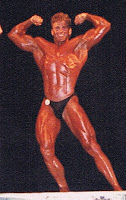 |
| Image 1: Vince Andrich, here at the 1988 Nevada State Bodybuilding Competition, knew it all along: Hard work, not high reps will get you the stage-ready physique everybody aspires... and I mean look at him are you seriously questioning Vince's expertise? |
If you have listened to the latest installments of
BodyRX Radio, the idea that
strength (and HIIT) training, not calorie restriction and endless cardio sessions pave the way to a leaner, more muscular physique. And although it may be of secondary importance whether you are burning 100kcal or 200kcal during those workouts, it stands out of question that you won't get rid of those damn spare tire, if you do not exert yourself in the gym (something Layne Norton is notorious for, as you may have seen in one of his workout videos or heard on BodyRX, lately) - because, after all, energy expenditure does count, even if
the energy equation is much more complex than the simplistic calories in vs. calories out paradigm that is still upheld by mainstream dietitians. The results of a recent study from scientists from the
Departments of Health and Sport Sciences at the
Salisbury University and the
University of South Carolina are may thus come handy to decide,
to which extent workout intensity and volume influence acute and post-exercise energy expenditure (
Mazetti. 2011). Or, to make it simple, does the good old bro-scientific high volume, high rep, low-weight training during a contest prep make any sense at all?
Exposed! The absurdity of going to the gym to "burn calories"
Scott A. Mazetti and his colleagues recruited 10
resistance trained young men (22+/-3.6 years) with an average body mass of 84+/-6.4kg, a height of 180+/-5.1cm, and a body fat percentage of 13+/-3.8% - an adequate model of the "average gymrat", if you asked me. After a 3-week familiarization and testing period,
all participants performed every of the following four different explosive strength training regimen in a randomly assigned, but counterbalanced order (cf. figure 1)
 |
| Figure 1: The four training protocols all trainees performed after an initial 3-week familiarization and testing period in a randomly assigned, but counterbalanced order (Mazetti. 2011) |
Now, you may complain that there is neither a "high rep" nor a "heavy group" in the conventional sense of 15+ pump training with an endless amount of sets, or the minimalist 1-2 rep approach of the hardcore HIT faction... granted, you are right. Nevertheless,
we should see a significant difference in energy expenditure between a 5x5 and a 4x10 (both normally considered as "hypertrophy training) regimen, already, if the good old saying "high(er) reps" for increased energy expenditure and subsequent fat loss had any merit.
 |
| Figure 2: Energy expenditure (kcal/min) during and after squatting, and bench pressing in the four training groups and total energy expenditure during the whole workout and 60min post-workout window (data adapted from Mazetti. 2011) |
As figure 2 goes to show, there are differences in energy expenditure between the different protocols, during the squat, the deadlift and up to 5 minutes post exercise, nevertheless, the "
the differences in total energy expenditure among protocols were not significant". So, even
if there were any merit in exercising primarily to burn calories
during your workout (a ridiculous way of trying to lose weight, which is predestined to fail, anyway), the -6kcal difference between the -13kcal difference between the least energy consuming form of training, i.e. 5x5 and the one with the highest energy demand, i.e. 4x10, would not even suffice to "make up" (another hilarious idea) for proverbial "apple à day", which keeps the doctor away.
 |
| Image 2: Don't let your lazy love handles decide what type of "cardio" you are doing! |
A brief note on what Lane already pointed out in the last installment of Body RX Radio: Classic low-intensity cardio training may "burn" calories for a week or two. Afterwards,
this type of chronic low-grade stressor is yet notorious for shutting down your metabolism and reducing your resting energy expenditure. Of high intensity aerobic exercise with intensities way beyond the 70% VO2max limit (YES! This is aerobic, two - cf. "
HIIT is the Hit! Even for Patients with Myocardial Infarctions!"),
we have known for decades that it increases your resting energy expenditure by "5 ±15% for 24 ± 48 h" (
Hunter. 1998). So, I suggest you get off the stationary bike you are just riding while browsing the web, get your running shoes out and do a couple of sprints. Your spare tire won't like that, but I bet
you will like the effect it's going to have on the person you see in the mirror, each morning ;-)
In view of these results, it appears prudent to reassess the often-heard advice of doing high reps for fat loss. Even
if you insist that you need to "burn calories" in the gym, it is
very unlikely that those few extra calories would make a noticeable difference in terms of how you look on stage - or just in front of your private mirror. Moreover, even this small advantage vanishes as soon, as you increase the workload by doing 2x7 + 2x6 with a heavy weight, or put simply:
Identical workload identical calorie expenditure.






